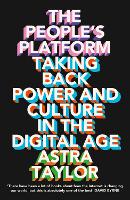


|
|
| book details |
The People’s Platform: Taking Back Power and Culture in the Digital Age
By (author) Astra Taylor

|
This book is currently unavailable. Enquire to check if we can source a used copy
|
| book description |
From a cutting-edge cultural commentator, a bold and brilliant challenge to cherished notions of the internet as the great leveler of our age. The internet has been hailed as an unprecedented democratising force, a place where everyone can participate. So why are minorities and marginalized groups under-represented on user-generated websites, with less than 15% of Wikipedia written by women? Why does keyword-jammed and star-studded churnalism proliferate, at the expense of in-depth, investigative journalism? And how have a handful of giant corporations like Facebook, Google and Apple seized control of our creativity, galvanizing individuals to produce content for free? ‘The People’s Platform’ argues that for all our ‘sharing’, the internet reflects real-world inequalities as much as it reduces them. Attention accrues to those who already have it. Cultural products are increasingly valued more as opportunities for data collection for distributors – content creators receive little for their efforts. News filters mean people mistake what interests them for what is really important. And we pay for our ‘free’ access to content by offering up our personal details to advertisers. The online world does offer a unique opportunity for greater freedom, but a democratic community that supports the diverse and lasting will not spring up from technology alone. If we want the internet to be a people’s platform, we will have to make it so.
| product details |
Normally shipped |
Publisher | HarperCollins Publishers
Published date | 15 Apr 2014
Language |
Format | Digital download
Pages | 288
Dimensions | 0 x 0 x 0mm (L x W x H)
Weight | 0g
ISBN | 978-0-0075-2560-7
Readership Age |
BISAC | computers / internet / general
| other options |
|
|
|
To view the items in your trolley please sign in.
| sign in |
|
|
|
| specials |
|
|
An epic love story with the pulse of a thriller that asks: what would you risk for a second chance at first love?
|
|

|
Mason Coile
Paperback / softback
224 pages
was: R 520.95
now: R 468.95
|
A terrifying locked-room mystery set in a remote outpost on Mars.
|
|
|
|